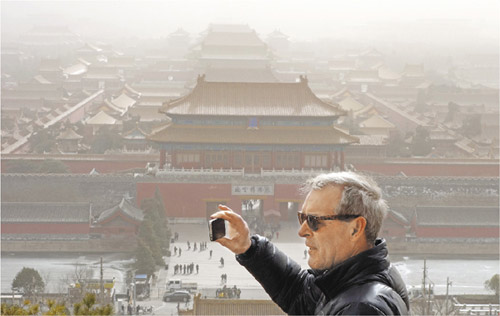|
查看原文
As a thick smog hung over Beijing last year, Stephanie Giambruno and her husband decided it was time for her and their two girls to return to the United States.
Giambruno's husband stayed in China for his job as general manager of a global technology company. He now Skypes with the family twice a day and lives with "constant jet lag" as he travels to Florida once a month to see them, she says.
While it's hard to be apart, Giambruno says Beijing's record air pollution left them no choice. She saw friends' children develop asthma. Their own daughters, at age six and 21 months, were often forced to remain indoors.
"It's not a way to live, to keep your baby inside with an air filter running," she said.
As bad air chokes Chinese cities, some expatriate employees are starting to leave families in their home countries, the latest sign of pollution's rising cost to the more than half a million foreigners working in China and the multinationals seeking to retain them. Smog in Beijing was worse than government standards most days last year, and environment ministry statistics show that 71 of 74 Chinese cities failed to meet air-quality standards.
"We are seeing some companies reverting to 1980s and 1990s hardship packages for executive-level candidates in cities that are hard hit with pollution," said Angie Eagan, managing director for China at the recruitment firm MRIC. "These packages are shaped around executives leaving their families in their home country and receiving an allowance for frequent home trips."
The World Health Organisation said in March that air pollution contributed to seven million deaths worldwide in 2012, with 40 per cent of those coming from the region dominated by China under the WHO's classification system. Outdoor air pollution can cause lung cancer, a WHO agency said last year, ranking it as a carcinogen for the first time.
Panasonic of Japan is considering increasing a living allowance for overseas workers in China by an undisclosed amount based on environmental factors, including air pollution.
Some companies remain reluctant to add to the 5 percent to 10 percent premium they already pay foreign employees in China, preferring to compensate them for pollution through perks such as more time off, paid trips to get away or covering the cost of insulating homes, said Fred Schlomann, managing director at human resources firm AIRINC.
A third of European Union Chamber of Commerce companies in China said air pollution had added to human-resource costs as expats made demands such as better pay and health care, as well as air filters, according to Ioana Kraft, general manager of the chamber's Shanghai chapter.
Two-thirds of the companies identified air quality as the top challenge in attracting foreign talent. Some 48 per cent of respondents to a survey this year by the American Chamber of Commerce for Beijing and Northeastern China said they had difficulties recruiting or retaining senior executives in China because of pollution.
James McGregor, Greater China chairman of consultancy Apco, is moving to Shanghai in May after being in Beijing for 25 years and says his wife spends more time in Minnesota in the US Midwest now, partly because of pollution. To provide a clean workplace, his firm installed air filters every 7.6 metres in its Beijing office, about a dozen devices for 30 staff. Even so, employees need more medical leave than 18 months ago.
"There are a lot of sick days, and sometimes our office in Beijing sounds like tuberculosis wards," said McGregor, 60. "People in our office are complaining they don't feel well, they don't have energy."
Levels of PM2.5, the tiny particles posing the greatest risk to human health, were stuck at hazardous levels for a week this year in Beijing and in 2013 peaked at 35 times the WHO's recommended limit. McGregor's firm is able to retain staff because it mostly hires locally. Even so, some clients have said that it's harder luring new talent.
"We're starting to see families not come," McGregor said. "In some cases, people are coming without their families and they are cutting a deal to go home more often."
Shane McNamara, an American executive who runs a 15-person interior design and construction company in China with his wife, said she may move her home base to Hong Kong because of the pollution. His wife, who is Chinese, has reduced work travel because of the bad air, he said.
While McNamara said he would stay on the mainland for business, he has his own health concerns. At his annual check-up at the Mayo Clinic in the US, the doctor told him that "absolutely with that kind of pollution his health would be impacted".
WHO director general Dr Margaret Chan Fung Fu-chun said in a March interview that "talented people have actually talked to me, and they've changed their decision to settle in China because of the air pollution". But, she said, "I think Chinese authorities understand this and they know what's going on."
Simon Gleave, Beijing-based partner in charge of KPMG's Asia-Pacific financial services practice, has spent US$4,000 for an air-quality monitor, US$15,000 for air filters around the house and has an indoor virtual-reality biking system for days when the air is too bad for him to cycle outside.
"If my daughter develops any health effects, though, we would leave immediately," said Gleave, who has lived in Beijing for more than a decade.
Chinese Premier Li Keqiang has called pollution a major problem and said the government would declare war on smog by removing high-emission cars from the road and closing coal-fired furnaces.
Almost two-thirds of the country's wealthy, those with assets of US$1.6 million or more, have left or plan to leave the country, according to the Hurun Report, a Shanghai-based research firm that tracks the country's rich. Environmental concerns are one of their most frequently cited reasons, according to Kristin Shi-Kupfer, who researches Chinese society at the Berlin-based Mercator Institute for China Studies.
Companies from Nestle to Japan's Sony are handing out masks to employees in China. Some are lining their offices with air filters, or hiring experts to coach executives on battling smog. Qoros Auto, a joint venture between an Israeli company and China's Chery Automobile, said it spent about 150,000 yuan (HK$188,000) for purifiers at its offices and 9,750 yuan on masks for employees.
Chris Buckley, a distributor of the Blueair brand of purifiers in Beijing, says corporate demand for air purifiers has doubled over the past year. Company orders could be in the range of US$100,000 to fit out a two-floor office, while mid- to upper-level corporate executives can get allowances of about 15,000 yuan to 20,000 yuan to offset costs of their home purifiers, he said.
Gordon Peters, a doctor who spent more than 30 years in the US Air Force and is now the Beijing-based North Asia medical director for risk advisory firm International SOS, says more corporations are hosting seminars on air pollution protection.
He lectures on checking pollution apps before leaving the house, which face masks to wear (N95 are best, as they block 95 per cent of pollutants), the importance of air purifiers and how to seal windows and doors.
While pollution is seen as a hindrance, companies are still able to attract expats because deep knowledge of the China market is becoming crucial to career and business advancement.
Robert Parkinson from the UK, who owns a 40-person executive search firm in Beijing, just spent more than US$6,000 on two purifiers for his office. While he acknowledges the pressures from pollution, he doesn't see it as a reason to leave because China offers advantages such as career experience, cultural exposure and good expat benefits.
Giambruno, who moved with her girls to Florida, is grateful for the clean air they now have. While the distance and global commute weigh on her and her husband, "that's where his job is right now, and he's got a great job and works for a great company", she said, though she declined to offer specifics of his job.
Even as Giambruno recalls things she loved about Beijing, where she worked as a freelance television producer, she also remembers outings that were cancelled when pollution spiked and smog so thick one January day that she thought she could touch it. She now appreciates Florida's blue skies.
"Every time I walk outside with the girls, I say 'breathe in,' because it's the most amazing smell: fresh air."
|
查看译文
据《南华早报》报道,去年,当北京被严重雾霾笼罩之时,在北京居住斯蒂芬妮和她的丈夫决定,她要带着两个女儿回美国。
丈夫则继续留在中国担任一家全球性科技企业的总经理。斯蒂芬妮说,丈夫现在每天都通过skype与家人交流,而且经常还要“倒时差”,因为他每个月都会飞回弗罗里达看望她和孩子。
尽管别离十分痛苦,可北京严重的雾霾使他们一家别无选择。她看到朋友家的小孩得了哮喘病,而她自己的两个女儿,一个六岁,另一个只有21个月,也经常无法出门。
她说:“小孩子整天待在屋子里,靠开着空气净化器过活,这根本让人无法生活。”
随着中国城市空气质量不断下降,许多外籍工作人员开始选择让家人回国,自己则只身待在中国,这是超过50万的在华工作者以及许多试图挽留他们的跨国公司所要付出的代价。去年大部分时间,北京的空气质量都低于国家标准。数据显示,调查的74个城市中,有71个未达标。
“为了挽留那些在重度污染城市工作的外籍高层,我们不得不重新采取80-90年代所用的方案” 人力资源公司(MRIC)的中国执行董事Angie Eagan说,“这些方案针对的是那些本人留在中国,家属生活在原国的外籍高层,除此之外,公司还要补贴他们频繁的探亲的费用。”
据世界卫生组织(WHO)3月调查显示,2012年,全球范围内空气污染致死人数多达700万,而其中40%来自中国区域(按照WHO划分标准)。一名WHO官员称,空气污染物可诱发肺癌,去年首次被列为致癌物。
松下公司(日本)正在考虑就包括空气污染在内的环境问题给予在华工作的外籍员工一定的补贴,但补贴标准并未公开。
另一人力资源公司AIRINC的执行董事Fred Schlomann提到,一些公司并不愿意给外籍员工提高5%-10%的津贴,他们更情愿给予其他方面的补助,例如延长假期时间、探亲行程报销以及异地家庭生活补助等等。
有1/3的中国欧盟商会公司称空气污染造成了公司开销的大量增加,因为外籍员工纷纷要求涨工资,加医疗保险,还要求加购空气净化器。
有2/3的公司表示,空气质量是影响人才引进的首要因素。在北京以及东北地区的美国商会做出一项的调查中,48%的受访者称,中国很难引进以及留住人才的一个重要原因就是是空气污染。
另一咨询公司的大中国区主席James McGregor决定5月份移居上海,前他已在北京居住了25年之久。由于空气污染,他说,他的妻子现在也更多的待在美国中西部的明尼苏达州。在公司北京的办公室里,他给30名职员配上了12台空气净化器,几乎是每隔7.6米就装有一台。即便如此,和过去的18个月相比请病假的人数还是增多了不少。
“好多时候大伙都病怏怏的,整个公室就像肺结核病房,”60岁的McGregor称,“我们办公室的员工总是觉得身体不适,无精打采的。”
PM2.5是对人类健康造成威胁的罪魁祸首,高浓度的PM2.5在北京上空已徘徊一周之久,给人们的健康带来持续威胁,2013年,其浓度已经35次爆表。McGregor的公司还能勉强留得住员工,因为这些员工多是本地人。但是,公司引进新人仍是是个难题。
“越来越多的人来京工作不带家属,” McGregor说,“这些人和亲人分居两地,还得经常回家探望。”
Shane McNamara和他妻子在北京共同经营一家有15名员工的室内设计及建筑公司。据他所称,由于北京空气污染严重,他的妻子不得不把家搬到香港,还要减少出差次数。
McNamara因为工作留在了内地,可他称仍对自己的健康状况十分担忧。他在美国的梅约医学中心做年度体检是,医生对他说“在这样严重的空气污染下生活,身体健康必然会受到影响”。
世界卫生组织医生Margaret Chan Fung Fu-chun在三月份的一次采访中谈到,“很多人来找我谈,他们本来是愿意来中国的,可是由于空气原因,又改变了主意,我认为中国政府是清楚这种状况的。”
现居住在北京的Simon Gleave是负责毕马威亚太地区金融服务的合伙人,他花4000美金购置了一台空气质量监控仪,又花了15000美金在家周围安上了空气净化器,他的家里装有全套的虚拟运动自行车设备,以便户外空气差时可以在家运动。
“如果我女儿身体健康出现了问题,那我们会毫不犹疑的离开北京。”Gleave说,他已经在北京生活了十多年。
总理李克强已经强调,环境污染是我们当前面临的首要难题,政府决心采取措施防止雾霾。现在,已经开始禁止驾驶大排放量汽车,勒令关闭高污染燃煤工厂。
胡润百富是一家追踪记录中国企业家变化的权威机构,总部在上海。据该公司调查显示,中国现在的富人(个人资产在160万以上)中的2/3已经或者正在准备移民。调查显示,空气环境是富人们考虑移民的首要因素。
许多在华企业(包括雀巢、索尼)都给员工分发口罩等物品。还有一些公司全面配备了空气净化器,并邀请专家来指公司导高层如何应对雾霾。观致汽车(Qoros Auto),一家以色列公司和中国奇瑞汽车合资创办的公司,据说在购买空气净化器上已经花费了15万元,购买口罩花费了9750元。
一家品牌空气净化器的北京分销商Chris Buckley说,去年空气净化器销量提高了一倍。两层的办公室大概就能出10万美金的订单,公司高层能获得1万5千至2万元人民币的家用净化器补贴。
Gordon Peters曾在美国空军做了30多年的医生,他现任风险咨询公司北京国际救援中心(International SOS)北亚地区的医疗顾问。他提到,现在越来越多的公司都在开展有关环境污染的研讨会。
尽管严重的污染带来重重阻力,在华企业对人才仍有一定的吸引力,因为对中国市场的深入了解对日后职业的发展是至关重要的。
来自英国的Robert Parkinson在北京开了一家有40名员工的调查公司,他花6000多美元给公司购置了两台净化器。他坦然尽管空气污染的确构成压力,但这并不足以使他离开北京,他认为北京还是有很多优势的,比如说工作环境、文化底蕴以及对外籍员工的福利待遇等等。
斯蒂芬妮已经带着几个孩子回到了佛罗里达州,现在,她们呼吸着新鲜的空气,十分畅快。虽然远距离探亲给自己和丈夫带来不便,“但那也只是现在的工作地点而已,而且我的丈夫的工作以及公司都十分出色,”她说,虽然她没有透露丈夫工作的具体情况。
斯蒂芬妮在回忆她住在北京时做自由电视制片人的那段时光,不禁想起了一月份爆发的那次严重雾霾,使她不得已取消了出行。那一切还都历历在目。她现在对佛罗里达的蔚蓝天空充满了感激。
“每次我和孩子走到外面时,我都会跟她们说:呼吸吧,这是世界上最新鲜最美妙的空气。”
(译者 陈理硕 编辑 丹妮)
扫一扫,关注微博微信
 
|


